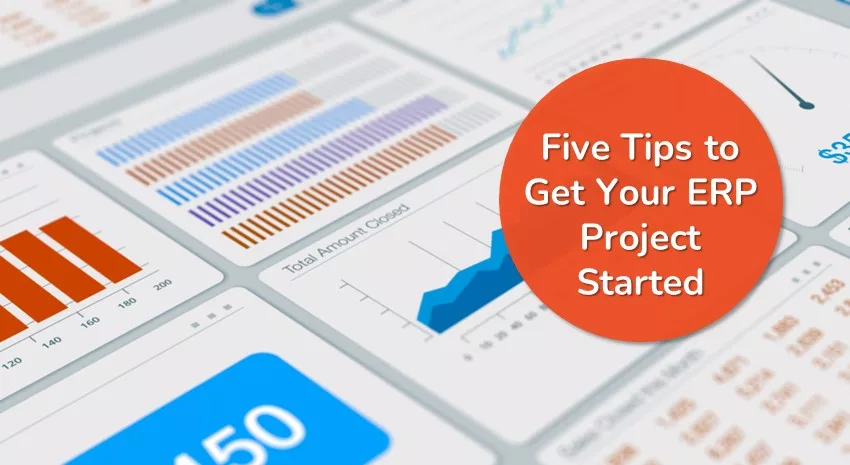Five Tips to Get Your ERP Implementation Started

Your organization decided to implement a new ERP solution. It likely took weeks or months to evaluate and review the options and finally decide. You might have thought you were out of the woods, but not necessarily. If you’re like many others, the act of starting the implementation process has yet to happen. You’ve realized an ERP implementation project is a big undertaking requiring resources and time most organizations will have difficulty doing without.
According to a 2022 survey of more than 1,350 ERP users in the US, UK, Australia, and New Zealand, more than 96 percent have confidence in their ability to navigate the early stages of the ERP purchase process, but 48 percent did not feel they had proper support when it came to the implementation.
An ERP solution is a serious investment, and implementing one should not be taken lightly. However, there are some things you can do to ensure that investment doesn’t sit on the shelf, but starts providing you with value as quickly and with as little disruption as possible:
1. Choose a Qualified Implementation Partner
This is something that ideally should have occurred during the purchase cycle, but it’s worth reiterating—even making a change if necessary. You took the time to choose the ERP that works best for your company. Make sure your ERP implementation partner has a strong track record of implementing the software but also one that understands your industry and has listened to you very carefully about your requirements so they can optimize your solution. You know your business, so they must listen and work collaboratively with you. You need to be able to count on them to understand the technical side of the equation.
2. Assign a Dedicated Project Sponsor
This is arguably the most important tip. Without a dedicated project sponsor, your implementation is in danger of failing. Someone with knowledge of your company and an ERP system, preferably your finance/accounting area, must be officially assigned to the sponsor role. This person needs:
- An understanding of the organization and your goals
- The authority to make decisions regarding staff assignments, equipment availability, and fund allocation
- The skills to manage a project and team—for example, the ability to communicate with internal and external stakeholders
- Support from leadership to hand over some of their normal responsibilities so they have the time they need to dedicate to the project
3. Consider Temporary Staffing
To ensure your dedicated sponsor can commit themselves to the ERP implementation project, you might need to consider bringing in temporary help. Managing your organization’s financial operations is important, so it cannot be neglected while the sponsor works on the implementation. Many services today provide top-notch leaders like financial and other skilled resources that can jump in and manage those areas for a limited time.
4. Include Subject Matter Experts with Tribal Knowledge
While your partner might have the knowledge of the technology and ERP implementation, they do not have the understanding of your business that your people do. One big mistake often made by organizations implementing new systems is not bringing the right stakeholders to the table. These people are the ones who know specific operations and workflows intimately; therefore, their input will be invaluable. While they don’t necessarily get a “vote”—ultimately, the sponsor needs to have the final say—they should have input and be listened to. Most partners are good at implementing ERP systems. But only you know your company operates. Remember that these people don’t need to be technical (in fact, they rarely are); they just need to understand their areas well enough to communicate what’s needed to your implementation partner.
5. Consider a Phased Implementation, or “MVP”
A new ERP implementation can be a major endeavor. While you might need all of it, ask yourself if you need it all at once. Many organizations opt for the “MVP” – Minimum Viable Product – approach, breaking the project into phases, beginning with what’s most urgently needed or what will deliver the most value the fastest. This doesn’t mean giving up on the features and functionality you signed up for initially; it’s just a more manageable way to reach the same ultimate results—one that will reduce disruption to your business, the strain on your resources, and even help with budgeting.
Involve Your Partner
Your implementation partner should want your success as much as you do. Remember that you are not alone in this; include your partner in the decisions—from assembling an implementation team to determining an MVP strategy. If your partner cannot or will not support you in every aspect, find someone else…your ERP investment is too important to settle.
Have questions about choosing or implementing an ERP solution? ArcherPoint offers business analysis, training, upgrades, and, of course, support plans.
